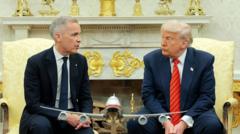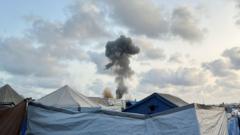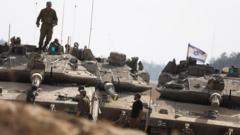Israel faces significant backlash from ally nations over military actions in Gaza, amid fears of escalating humanitarian disaster.
Major Allies Condemn Israel Over Escalation in Gaza Conflict

Major Allies Condemn Israel Over Escalation in Gaza Conflict
Warnings issued amid humanitarian crisis as tensions rise in the region
As the war in Gaza enters its 19th month, Israel has found itself increasingly isolated among its traditional allies due to its ongoing military actions and the blockade of humanitarian aid. Britain, France, and Canada have united in a rare show of disapproval, urging Israel to halt its “wholly disproportionate” actions that have led to a rising death toll and dire humanitarian situations within Gaza.
In a significant move, Britain announced the suspension of talks aimed at expanding a free-trade agreement with Israel, a direct response to the perceived disregard for civilian safety amidst the conflict. The three nations have warned that if Israel continues its military offensive and fails to relieve restrictions on aid, they will take "further concrete actions."
Israel's Prime Minister, Benjamin Netanyahu, reacted vehemently to these warnings, claiming that the allied nations had gifted Hamas a "huge prize" and accused them of inciting a repeat of the attacks from October 7 that launched the current conflict.
In stark contrast to diplomatic exchanges, a senior United Nations humanitarian official, Tom Fletcher, urged immediate action, stating that up to 14,000 babies may face death within 48 hours unless humanitarian aid flows to Gaza. However, the U.N. later appeared to temper those alarming claims, reflecting the complexities and contentious nature of the ongoing humanitarian crisis in the region.
The tension continues to escalate as diplomatic battles intersect with alarming humanitarian needs, placing pressure on international relations and raising questions about the future of Israel's approach in the conflict.
In a significant move, Britain announced the suspension of talks aimed at expanding a free-trade agreement with Israel, a direct response to the perceived disregard for civilian safety amidst the conflict. The three nations have warned that if Israel continues its military offensive and fails to relieve restrictions on aid, they will take "further concrete actions."
Israel's Prime Minister, Benjamin Netanyahu, reacted vehemently to these warnings, claiming that the allied nations had gifted Hamas a "huge prize" and accused them of inciting a repeat of the attacks from October 7 that launched the current conflict.
In stark contrast to diplomatic exchanges, a senior United Nations humanitarian official, Tom Fletcher, urged immediate action, stating that up to 14,000 babies may face death within 48 hours unless humanitarian aid flows to Gaza. However, the U.N. later appeared to temper those alarming claims, reflecting the complexities and contentious nature of the ongoing humanitarian crisis in the region.
The tension continues to escalate as diplomatic battles intersect with alarming humanitarian needs, placing pressure on international relations and raising questions about the future of Israel's approach in the conflict.





















